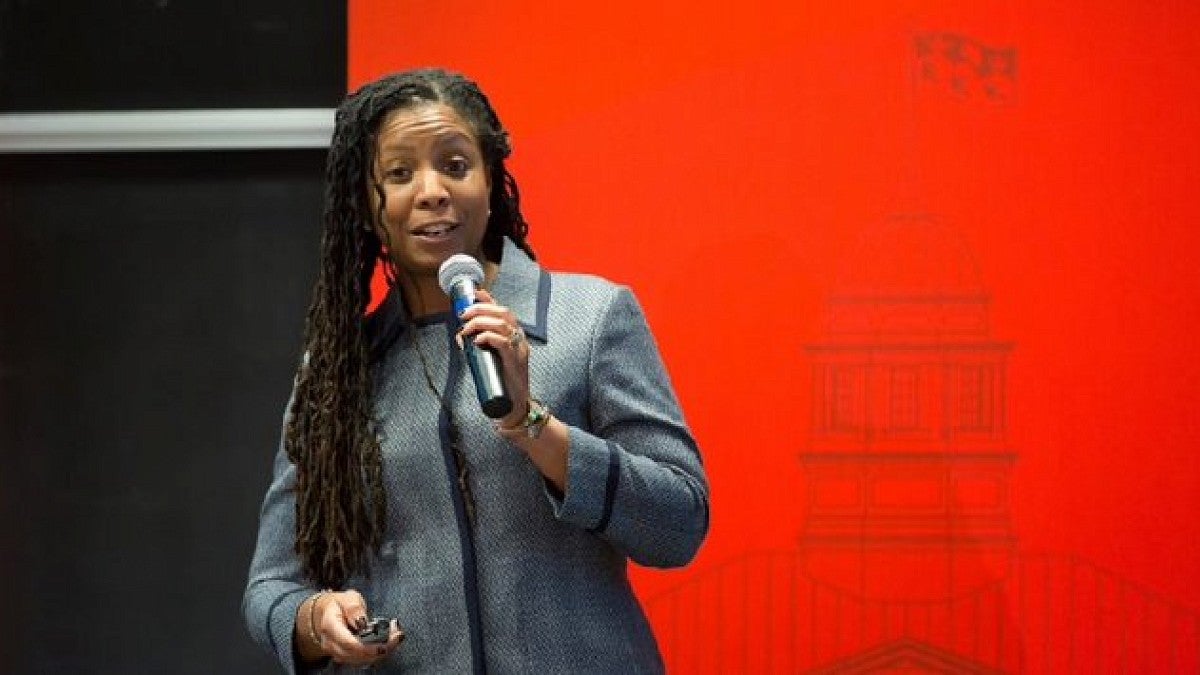An expert on workplace dynamics will speak at the UO on how organizations can sometimes stifle authenticity, making people feel they must suppress their true selves to conform to workplace norms.
Highlighting her research and discussing how leaders can build an environment of trust in the workplace is professor Patricia Faison Hewlin from the Desautels Faculty of Management at McGill University, in Montreal, Québec, Canada. Her talk is part of this year’s African American Workshop and Lecture Series.
Hewlin will present “Contemporary Challenges Associated with Authenticity in the Workplace” Jan. 23 at 5:30 p.m. in the Redwood Auditorium in the Erb Memorial Union.
Hewlin’s research on the complex dynamics in the workplace focuses on employee silence and the challenges organizations face in promoting authentic self-expression.
“We want everyone to thrive and succeed in the workplace,” Hewlin said, “but organizations need feedback from their employees for relationships to develop and to learn from mistakes, to improve, to innovate. Having those diverse perspectives is critical to organizations functioning.”
Asking people to speak up, however, can be a challenge, Hewlin said, but trust begins with leaders, because they set the tone.
“In order to build an environment of trust, leaders must be consistent in their decision-making, be supportive, and be open to diverse opinions,” she said.
How leaders respond signals to employees the degree to which they can trust the leader. The leader doesn’t necessarily have to agree with them, but being appreciative that they’re receiving the feedback opens the door for people to be more truthful about their experiences in the workplace and just being more authentic in general.
“This has shown up in research regarding psychological safety, in particular,” she said. “Supportive leaders, leaders who are inclusive, who create environments of psychological safety, … create a pathway for people to be more authentic.”
Hewlin said the problem is exacerbated, particularly if individuals are in a marginalized group. Her research has shown that when individuals report that they hold a minority status — whether it’s race, gender, age or religion — the more likely they feel pressured to conceal aspects of themselves in the workplace to fit in.
“I have looked at data across 10 years and found that African Americans tend to score higher in terms of that pressure and to suppress aspects of their identity in the workplace,” she said. “The McKinsey report on women in the workplace showed that a lot of high potential, highly skilled Black women are leaving their workplaces for better opportunities. People who are not feeling that they can grow or develop or be heard are now taking more agency to find better opportunities.
“My goal is to help individuals understand what authenticity on their own terms means to them, particularly people who have experienced marginalization.”
The pandemic magnified the problem, leaving many organizations scrambling to find ways to keep good people from leaving. By pretending to fit in, some employees eventually decided they didn’t want to.
“The leadership that was required before the pandemic has changed, and more is needed for creating that supportive work environment where people feel valued and people feel that they can be heard and understood,” Hewlin said.
Employee silence and suppression of personal values is stressful and can also hinder productivity, but leaders can help employees feel comfortable enough to speak up and provide critical feedback.
Likewise, leaders have a responsibility to interpret feedback without bias.
“Leaders have to continue to grow and develop themselves, identify where they are lacking in terms of the way they perceive others and when they receive feedback find ways to reward the person for speaking up.”
In addition to her research, Hewlin teaches leadership courses to undergraduates.
“It’s definitely a topic that’s relevant to everyone. Leadership is not easy, but I appreciate the opportunity to prepare the next generation of leaders with the tips and tools to help them be successful and be part of the solution rather than part of the problem,” she said.
“I tell my students that leadership is not for the faint of heart. If they’re running to become a leader, they need to check their motives.”
—By Sharleen Nelson, University Communications


